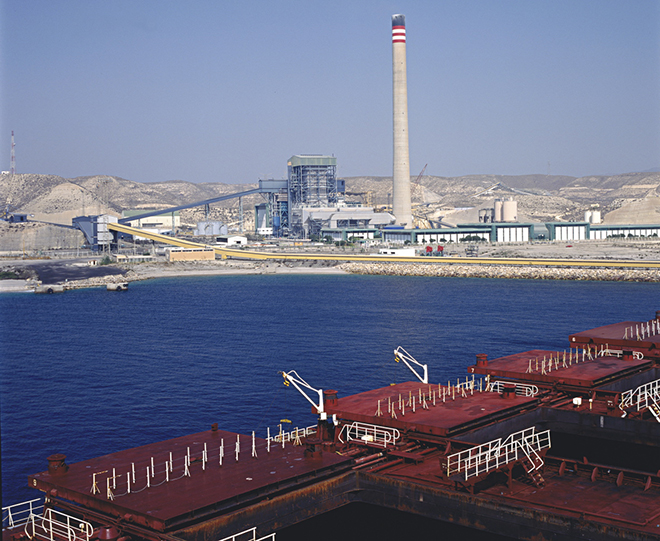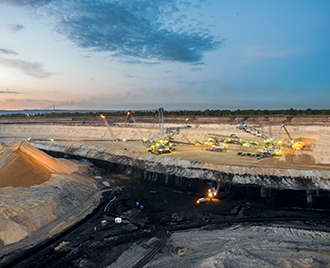
| Endesa's Litoral de Almeria coal-fired power plant in Spain. The utility wrote down its coal assets in 2019. |
Utilities in Europe are continuing to move on from coal power after a challenging price environment led to billions in write-downs and a wave of early closures in 2019, with government phaseouts set to cut down the list of remaining power plants even further in the coming years.
Francesco Starace, CEO of Enel SpA, said March 19 that the Italian utility's renewable power projects had produced more electricity than all of its thermal plants combined over the previous year, a major turning point for one of the world's largest power groups.
The balance in its portfolio will continue to shift: Enel subsidiary Endesa SA announced in November 2019 that it plans to close all of its remaining coal plants in Spain and Portugal within the next two years after recording €1.47 billion in impairments on the assets. Enel has also closed coal plants in Italy and Chile, and recorded more than €4 billion in total write-downs related to the fossil fuel in 2019.
Closures by Enel and other utilities, along with lower run rates caused by commodity price movements, helped drive down coal generation by 3% in 2019, according to an analysis by Ember, a London-based think tank focused on speeding up coal phaseouts. The drop kept global emissions flat for the first time in several years, with steep declines in countries including Germany.
"It's clear that in Europe and the U.S. coal fell off a cliff," Dave Jones, an analyst at Ember, said in an email.
Companies including Iberdrola SA, Engie SA and Vattenfall AB have closed or sold off large shares of their coal-fired capacity in recent years, instead building less emissions-intensive gas plants and taking advantage of the subsidized shift to renewables. Private groups like Energetický a prumyslový holding a.s., a Czech investor, and U.S.-based private equity firm Riverstone Holdings LLC have snapped up many of the assets, although traditional utilities still own vast amounts of coal plants across Europe.

Minimizing risks
The economic case for coal has become weaker as a result of both policy decisions and market effects. Shutdowns of coal power plants have accelerated in the U.K., where generators have had to pay an added carbon price on top of the EU's Emission Trading System.
U.K. power producer Drax Group PLC said in February that it would stop burning coal at the country's largest power plant in 2021. "Economically, the decision was quite clear," Will Gardiner, the company's CEO, said on a Feb. 27 earnings call. "We felt it was very much the right time to do this."
New-build coal projects have also struggled: Polish utilities Energa SA and Enea SA recently all but pulled the plug on a 1-GW hard coal plant in light of rising pressure from policymakers and banks, who have moved in droves to restrict financing for new coal.
Enel's Starace said proactively shutting down coal capacity protects the company from future action by policymakers to drive down emissions. "The coal phaseout will minimize the risks associated with the foreseeable acceleration of regulatory constraints aimed at mitigating climate change," Starace said.
 A coal mine in Russia, where political pressure on emissions reductions is much lower. |
Enel is far from the only company turning its back on coal. Germany's Uniper SE announced in January that it would close all but one of its coal plants in the country by 2025, in part to take advantage of auctions that will see operators compensated for early closures. Uniper recorded just over €1 billion in impairments in 2019, mainly related to its fossil fuel plants in the Netherlands, the U.K., and Germany.
RWE AG, Europe's largest carbon emitter, will also start shutting down plants in line with Germany's phaseout policy and registered more than €1.3 billion in impairments due to impending early closures of hard coal plants in both Germany and the Netherlands during 2019. Additional write-downs of its lignite power plants and opencast mines in Germany were partly compensated by the government.
Political pressure
Uniper's CEO, Andreas Schierenbeck, said on a March 10 earnings call that the company also wants to cut its carbon content to limit political, environmental and regulatory exposure. But Uniper is simultaneously holding on to coal in Russia, where it is expanding a 2,300-MW plant — illustrating how much political pressure still plays a role in phasing out the fuel.
"Politicians in many European countries are putting measures and laws [in place], such as the bid to phase out coal in Germany or the reinforced EU Emissions Trading [System]," Schierenbeck said. "However, there are other countries and jurisdictions outside Europe where the aim for decarbonization plays a somewhat different role, something that we need to accept and reflect in our ambitions."
The Carbon Tracker Initiative, a London-based climate think tank, said in a report on March 12 that developers are still pursuing 499 GW of coal capacity around the world, including in Europe, risking $638 billion in stranded investments.
Nevertheless, analysts predict coal power will continue its decline in Europe, even if the coronavirus crisis momentarily distracts governments from climate action.
"One thing is for sure, the coal fall we saw in 2019 will only accelerate in the 2020s," said Ember's Jones.



